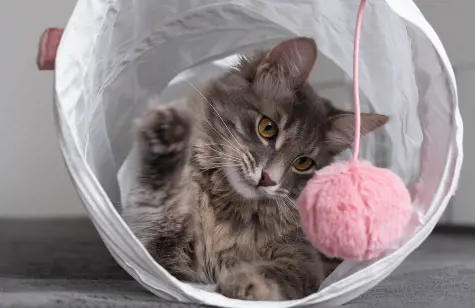Unveiling feline fears: What cats are truly scared of
16th August, 2023

Introduction
You've probably noticed your cat's keen instincts, their alertness, and their quick reactions. These are all part of their survival mechanisms. But did you know that your feline friend also experiences fear?
Yes, it's true. Cats, like humans, have their own set of fears and anxieties. Understanding these fears can help you create a better, safer environment for your furry friend.
In this article, we'll delve into what cats are scared of, how you can comfort a scared cat, and steps to reduce fear in your kitty.
Understanding feline fear: What are cats scared of?
Cats are sensitive creatures. They are easily spooked by a variety of things, from sudden noises to unfamiliar environments. However for most cats, fear is not a bad thing.
It's a natural fear response, that helps them avoid danger. But when your cat's fear starts interfering with their daily activities, it's time to take notice.
A cat's fear can be triggered by a multitude of factors, these triggers can include:
- Unfamiliarity whether it's a new person, a new pet, a new house, or a new piece of furniture, anything that disrupts their routine can make them anxious
- Loud noises, such as thunderstorms and fireworks
- Water
- Certain smells or sounds
Common fears in cats
Cats, like humans, are capable of experiencing fear. While each cat may have its own unique set of fears, there are a few common fears that many cats tend to share.
It's advised to recognise these fears in order to provide a safe and nurturing environment for our feline companions.
- Loud noises: Cats are known for their acute hearing, so loud noises can be particularly distressing for them. Thunderstorms, fireworks, or even household appliances like blenders or vacuum cleaners can trigger fear in cats. They may exhibit signs of anxiety, such as hiding, trembling, or attempting to escape from the noise.
- Strangers: Cats are typically territorial creatures, and they may become anxious or fearful when encountering unfamiliar people. This fear can extend to visitors in the home, veterinarians, or even a new family member. Cats may exhibit defensive behaviours such as hissing, growling, or hiding when confronted with strangers.
- Confinement: Many cats dislike being confined in small spaces or being restrained. This fear can manifest when they are placed in carriers, taken to the vet, or even during grooming or nail trimming sessions. Cats may vocalise, struggle, or exhibit signs of stress, such as rapid breathing or dilated pupils when feeling confined.
- Other animals: Cats are known for their independent nature, and they may feel threatened or fearful when encountering other animals, especially unfamiliar cats or dogs. This fear can lead to aggression or defensive behaviours, such as hissing, growling, or even scratching or biting.
- Changes in routine: Cats are creatures of habit, and any sudden changes in their routine can trigger fear or anxiety. This can include moving to a new home, rearranging furniture, or even changes in feeding or litter box locations. Cats may exhibit signs of stress, such as excessive grooming, loss of appetite, or urinating outside the litter box when faced with changes in their environment.
It's important to note that each cat is an individual, and their fears may vary. Some cats may be more resilient and adaptable, while others may be more prone to anxiety or fear.
If you notice that your cat is exhibiting signs of fear or stress, it's essential to provide a calm and supportive environment, as well as consult with a veterinarian or animal behaviourist for further guidance.
Cats may experience fears related to loud noises, strangers, confinement, other animals, and changes in routine. Understanding and addressing these various cat fears, can help create a harmonious and stress-free environment for our feline companions.
Signs that your cat is scared
Understanding the nuances of your feline friend's behaviour can be a bit of a challenge, especially when trying to decipher their emotional state. Paying close attention to your cat's body language, vocalisations, and overall behaviour can provide significant clues.
A scared or nervous cat may exhibit signs such as dilated pupils, flattened ears, and a puffed-up tail. They may also hide or try to make themselves appear smaller. A significant change in your cat's routine, such as a decrease in appetite or unusual litter box habits, can also signal that you have a frightened cat.
Your cat might also communicate their distress vocally. Hissing, growling, or unusually loud meowing can all indicate fear or anxiety. Furthermore, excessive grooming or pacing could be signs of a nervous or fearful cat.
Remember, each cat is unique and may express fear or anxiety in different ways. If you notice any abrupt changes in your cat's behaviour that persist, it’s best to consult with a veterinarian. After all, our feline companions rely on us to understand their needs and ensure their well being.
How to comfort a scared cat
Comforting a scared cat requires patience, understanding, and a gentle approach. Cats can become fearful due to various reasons such as new environments, loud noises, or previous traumatic experiences.
Here are some steps you can take to help comfort a scared cat:
- Create a safe space: Set up a quiet, secluded area in your home where the scared cat can retreat to. This space should have a cosy bed, a litter box, and some toys. Make sure the area is away from any potential stressors like loud noises or other pets.
- Provide a hiding spot: Cats often seek out hiding spots when they feel scared or threatened. Place a cardboard box or a covered cat bed in their safe space, as this will give them a hiding spot where they can feel secure.
- Maintain a calm environment: Keep the environment around the scared cat as calm and quiet as possible. Lowering the volume of the TV or turning off loud music can help create a peaceful atmosphere.
- Use positive reinforcement: Offer treats or their favourite food as a reward whenever the scared cat displays calm behaviour. This helps associate positive experiences with their safe space and encourages them to feel more relaxed.
- Engage in gentle interactions: Approach the scared cat slowly and calmly, using a soothing voice. Allow the cat to initiate contact and avoid making sudden movements that might startle them. Offer gentle pets and scratches in areas they enjoy, like under the chin or behind the ears.
- Use pheromone diffuser: A pheromone diffuser emits synthetic pheromones that help create a sense of security for cats. Placing these diffusers in the scared cat's safe space can aid in reducing their anxiety.
- Gradual acclimation: Give the cat time to adjust to their new environment or any changes that may be causing their fear. Introduce them to new stimuli gradually, allowing them to explore at their own pace.
Over time, with patience and consistent positive reinforcement, the scared cat starts to feel more comfortable in their new environment. They become more open to interactions and gradually overcome their fears.
For more tips on how to help your pet if it suffers from anxiety, check out our other articles!
Steps to reduce fear in your cat

Reducing fear in your cat requires consistency and patience.
- Identify the triggers for frightened cats.
- Once you know what's causing their fear, you can take steps to alleviate it.
- For example, if your cat is scared of loud noises, try to create a quiet environment for them. You can also use white noise or soft music to drown out the frightening sounds that scare cats.
- Socialisation is also crucial in reducing fear. Gradually exposing your cat to new people, pets, and environments can help them become more comfortable.
Top tips on dealing with a scared cat
Experts recommend using positive reinforcement to help your cat overcome their fears. This involves rewarding your cat for brave behaviour, which can help them associate positive experiences with their fear triggers.
Additionally, it's important to stay calm and composed. Cats can pick up on human emotions, so if you're anxious, your cat might become anxious too.
When to seek professional help for your cat's fears
If your cat's fears are severe and are affecting their quality of life, it might be time to seek professional help. A veterinarian or a certified animal behaviourist can provide guidance and treatment options, such as behaviour therapy or medication.
Are all cats scared of cucumbers?
No, not all cats are scared of cucumbers. The viral videos of cats jumping in fear at the sight of a cucumber are likely due to the surprise element, not the cucumber itself.
Can cats overcome their fears?
Yes, with patience, understanding, and the right approach, cats can overcome their fears.
Can fear cause health problems in cats?
Yes, chronic fear and stress can lead to various health issues in cats, including urinary problems, digestive issues, and weakened immune system.
How can I help my cat overcome their fear of car rides?
Create a comfortable and secure environment inside the car by using a carrier with familiar bedding and toys. Covering the carrier with a towel or blanket can help reduce visual stimuli and create a sense of security. Play calming music or use white noise to mask the sounds of the car engine and other noises that may cause anxiety.
Conclusion
Understanding what cats are scared of is the first step in creating a safe and comfortable environment for your furry friend.
With patience, understanding, and a little help from experts, you can help your cat overcome their fears and live a happier, healthier life.
Remember, to ensure your furry friend is covered in case of emergencies, consider pet insurance. To get a pet insurance quote for your furry friend you can get a quote through our website. If you would like to talk to one of our pet insurance team, you can get in touch with us on 0330 102 5748. Your cat's well being is our top priority.
Helpful Pages
Recent Posts
Pet Insurance Quote
- 98% claims paid *
- Claims paid directly to vets
- 24/7 vet video consultations
- Interest free monthly payments




